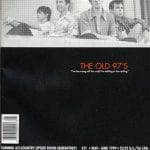Ronnie Dawson – Big D
Ronnie Dawson may be celebrating his 60th birthday on August 11, but don’t think for a minute he’s slowing down. The Dallas rock ‘n’ roller just released More Bad Habits, a project on Yep Roc Records that contains his first stereo studio recordings in the United States since the 1960s. The set shows that the Blonde Bomber is still in top form, whether blasting away in rockabilly mode or crooning a countrified ditty.
Though Dawson may be getting up there in years, there’s nothing old and tired about his energetic live shows. He cites a wholesome lifestyle and a positive outlook on life as contributing to his seemingly endless energy and stamina onstage.
“I’ve worked at it,” he says. “You know, I’ve seen both sides. I’ve seen guys that didn’t take care of themselves and they’re dead. They were dead before they got out of their 30s. On the other hand, I’ve seen other people that took care of themselves and they were able to maintain.
“I didn’t spend a whole lotta time in beer joints. I tried to adopt a healthy lifestyle. That means diet, and some kind of a workout regimen. So since the early ’60s, I’ve been running. That’s really helped not only from a physical standpoint, but from a mental and spiritual standpoint also. I run no less than three days a week when I’m home. When I’m on the road I do it when I can. I’ll find the time to do it.”
Dawson has a remarkable life story, one that begins amidst the thrills and excitement of the late ’50s rock ‘n’ roll explosion. Born in Dallas in 1939, he was raised as an only child in Waxahachie (about 20 miles south of Dallas) by Pinkie and Gladys Dawson. Ronnie’s dad, Pinkie, had a swing band that was heard on KRLD-AM radio. When his father discovered how much Ronnie liked music, they acquired a guitar and Ronnie learned the basics.
Soon after, Dawson formed his own band, Ronnie Dee & the D Men; within two months, they entered the talent contest at KRLD’s Big D Jamboree. The Big D Jamboree was a radio show in the mode of the Grand Ole Opry that presented country stars of the day performing their hits in a live setting, while also giving exposure to up-and-coming new talent. Dawson and his band proceeded to win the contest ten weeks in a row.
“It was really a country show,” he recalls. “When rock ‘n’ roll came in, it went that way a little bit because their crowds had started to diminish a little bit. Every once in a while, they’d change the format. They’d put up on the bulletin board backstage ‘all acts must do country’ and that pertained to everyone but myself. That’s how we won it, that’s how we got on the show and I always argued that with them. I told them, ‘I don’t do country.’ So they would put me on at the end of the show. Mainly because we had a great rapport with the crowd, that was the only reason they didn’t say, ‘See ya’.”
But there was also a trying time or two. He remembers one particular incident with legendary country singer Webb Pierce. “We had always heard that Webb Pierce hated rock ‘n’ roll,” Dawson relates. “In those days it was very divided. Ernest Tubb didn’t care. He loved everybody and to me, he was the real cat. He loved rock ‘n’ roll and he always had a good word for everybody.
“Webb Pierce came down and we were rehearsing in the rehearsal room and he sent the doorman down to tell us to please refrain from rehearsing, that it was bothering him. I told him to go back and tell whoever sent him that we have just as much right to rehearse here as he does. Pierce had already done part of his show. Most of the time those artists would come on and do the main part of the show that was broadcast on KRLD radio. Then they would come back for a run-through of everybody at the end.
“Well, I saw him walk by the door with his guitar, so he left without doing the second part of his show. It ended up that they refused to pay him. He wasn’t very friendly anyway, so I kinda enjoyed doing that to him. Among the others, Hank Snow, Roy Acuff were really nice, but there were a couple of performers that weren’t nice to anyone.”
The result of his appearances on The Big D Jamboree was that he attracted the attention of Ed MacLemore, who at the time managed Gene Vincent. Dawson’s first two singles were “Action Packed” on Backbeat Records and the now legendary “Rockin’ Bones” on MacLemore’s Rockin’ label. Both singles sold well regionally and led to an offer from Dick Clark to record for Swan Records and appear on American Bandstand.
At that point, though, the payola scandal hit, affecting Clark and other prominent disc jockeys. Dawson explains, “Dick Clark was a smart enough guy that he didn’t have any of his holdings in his name. They were all in other people’s names….Dick Clark couldn’t push anything on the show that was on a label that he was affiliated with, that’s what they told me. After the payola investigation, there were certain labels he couldn’t go near because of his affiliation with them. There was some weirdness going on, but I don’t know, at the time I was nineteen, wild eyed and ready.” Dawson never recorded for Swan, and his career appeared dead.




